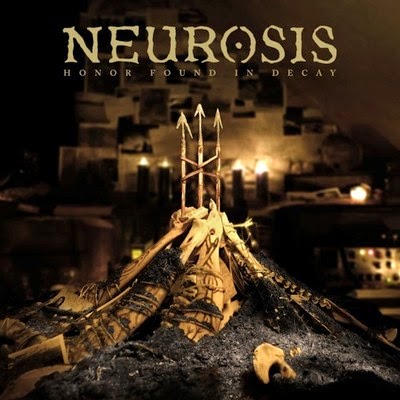Revisiting the uncharted
 This review opens with a title that some of the more perceptive readers would deem absurd and some of the more radical ones, stupid. And yet, the very existence of postmodernism is dependent on how good we are at reshaping the old into the new. Making it as refreshing and intriguing as it was when it first came into being. More important still, is the ability of postmodern art to go beyond this premise, set itself in a world of its own and exist there on its own terms. And who else would I ever believe capable of creating an entire world for their music to exist in, if not Toby Driver. Ever since Choirs of the Eye (and for some, early maudlin of the Well), Toby's musical identity has been shining through layers of inspiration and styles he has explored. None of what he did has ever seemed either derivative, calculated or entirely spontaneous and the fact I don't really understand how or why he does what he does made me wonder - is it part of the fun? Yes, it actually is a big chunk of it - admiring someone's brilliance while being blinded by it.
This review opens with a title that some of the more perceptive readers would deem absurd and some of the more radical ones, stupid. And yet, the very existence of postmodernism is dependent on how good we are at reshaping the old into the new. Making it as refreshing and intriguing as it was when it first came into being. More important still, is the ability of postmodern art to go beyond this premise, set itself in a world of its own and exist there on its own terms. And who else would I ever believe capable of creating an entire world for their music to exist in, if not Toby Driver. Ever since Choirs of the Eye (and for some, early maudlin of the Well), Toby's musical identity has been shining through layers of inspiration and styles he has explored. None of what he did has ever seemed either derivative, calculated or entirely spontaneous and the fact I don't really understand how or why he does what he does made me wonder - is it part of the fun? Yes, it actually is a big chunk of it - admiring someone's brilliance while being blinded by it.It's obvious that Toby has decided to create more focused, more compact albums after Hubardo, arguably the most diverse and, without a doubt, the longest album in his career. Unlike pre-Hubardo records, both Coffins on Io and Plastic House on Base of Sky feature a somewhat vintage sound. Strongly inspired by Susumu Hirasawa and by the 80s icons, with the most prominent being David Bowie, Joy Division, Brian Ferry, Vangelis and the whole era of progressive rock and electronica, Toby does what he does best - he dislocates all elements from their hinges, makes them his own, unique - they are doors to his plastic house. It's especially true on the new record where the border between organic and synthetic became completely blurred. As radical as ever, Kayo Dot takes no prisoners despite leaving their extreme rock roots behind. Plastic House on Base of Sky is a playground for electronic polyphony, unrelenting, rhythmically complex and intense but as usual, a profound feeling of purpose grows stronger with every subsequent spin. This is one of those records that interact with the listener on the most personal level possible, mostly because the artistic process itself knew no compromise. That's why reviewing Kayo Dot albums is so daunting - the band doesn't try to prove anything to anyone. Toby seems to be lost in a maelstrom of creativity and despite fiercely pushing the envelope, he never loses track of what makes Kayo Dot music so engaging: the unrefined, frantically honest emotional charge put into it.
The latest Kayo Dot release catches Toby Driver drifting further and further away from his extreme rock roots, deep into the unknown where the old merges with the new to become something, somewhere. To be honest, it has never mattered to me if it's metal or not. Despite being extreme in a general sense, Kayo Dot was never meant to appeal to metal fans or fans of any other specific genre. I honestly don't know who is this music addressed to, and I doubt it is actually addressed to anyone in particular. All I can say is that you should approach the album with an open mind and forget what you know about art-rock, jazz, progressive electronica or synth-pop. Plastic House on Base of Sky is neither of those things. It is more.




